

Microsoft Windows. Microsoft Windows (or simply Windows) is a metafamily of graphical operating systems developed, marketed, and sold by Microsoft.
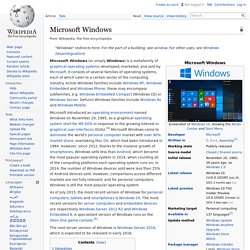
It consists of several families of operating systems, each of which cater to a certain sector of the computing industry. Active Windows families include Windows NT, Windows Embedded and Windows Phone; these may encompass subfamilies, e.g. Windows Embedded Compact (Windows CE) or Windows Server. Defunct Windows families include Windows 9x and Windows Mobile. The next server version of Windows is Windows Server 2016, which is expected to be released in early 2016. Genealogy By marketing role Microsoft, the developer of Windows, has registered several trademarks each of which denote a family of Windows operating systems that target a specific sector of the computing industry. The following Windows families are no longer being developed: Windows 9x: An operating system that targeted consumers market.
Version history Early versions Windows 3.x. Linux kernel. The Linux kernel is released under the GNU General Public License version 2 (GPLv2)[6] (plus some firmware images with various non-free licenses[8]), and is developed by contributors worldwide.
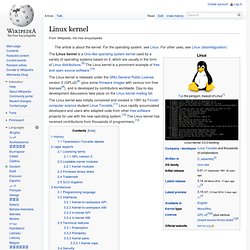
Day-to-day development discussions take place on the Linux kernel mailing list. The Linux kernel was initially conceived and created in 1991 by Finnish computer science student Linus Torvalds.[11] Linux rapidly accumulated developers and users who adapted code from other free software projects for use with the new operating system.[12] The Linux kernel has received contributions from thousands of programmers.[13] History[edit] In April 1991, Linus Torvalds, a 21-year-old student at the University of Helsinki, Finland started working on some simple ideas for an operating system. He started with a task switcher in Intel 80386 assembly language and a terminal driver.
After that, many people contributed code to the project. In December 1991, Linux 0.11 was released. Fedora (operating system) Fedora /fɨˈdɒr.ə/ (formerly Fedora Core) is an operating system based on the Linux kernel, developed by the community-supported Fedora Project and owned by Red Hat.
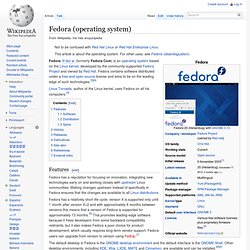
Fedora contains software distributed under a free and open source license and aims to be on the leading edge of such technologies.[3][4] Linus Torvalds, author of the Linux kernel, uses Fedora on all his computers.[5] Fedora 20 with KDE Fedora uses the RPM package management system. Security is also important in Fedora with one specific security feature being Security-Enhanced Linux, which implements a variety of security policies, including mandatory access controls, and which Fedora adopted early on.[10] Fedora comes installed with a wide range of software such as LibreOffice and Firefox.
Fedora is distributed in several different ways:[13] Before Fedora 7, Fedora was called Fedora Core after the name of one of the two main software repositories - Core and Extras. Fedora Project Homepage. Debian. Debian (/ˈdɛbiən/) is an operating system composed of free software mostly carrying the GNU General Public License.[7] The operating system is developed by an internet collaboration of volunteers aligned with The Debian Project.
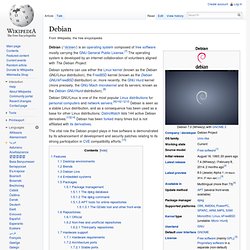
Debian systems can use either the Linux kernel (known as the Debian GNU/Linux distribution), the FreeBSD kernel (known as the Debian GNU/kFreeBSD distribution) or, more recently, the GNU Hurd kernel (more precisely, the GNU Mach microkernel and its servers; known as the Debian GNU/Hurd distribution).[8] Ubuntu (operating system) Development of Ubuntu is led by Canonical Ltd.,[11] a company based on the Isle of Man and owned by South African entrepreneur Mark Shuttleworth.
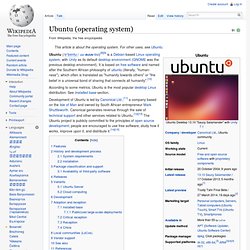
Canonical generates revenue through the sale of technical support and other services related to Ubuntu.[12][13] The Ubuntu project is publicly committed to the principles of open source development; people are encouraged to use free software, study how it works, improve upon it, and distribute it.[14][15] GNOME (the former default desktop) supports more than 46 languages.[17] For increased security, the sudo tool is used to assign temporary privileges for performing administrative tasks, allowing the root account to remain locked, and preventing inexperienced users from inadvertently making catastrophic system changes or opening security holes.[18] PolicyKit is also being widely implemented into the desktop to further harden the system through the principle of least privilege.
Homepage. The Universal Operating System. Linux Mint. Is a computer operating system based on the Linux distribution Ubuntu . Linux Mint provides a more complete out of the box experience by including proprietary and patented software . [ 1 ] Linux Mint introduced its first release, named "Ada", in 2006. Its latest and 13th release is "Maya". [ edit ] History Linux Mint started in 2006 with a beta release called 1.0 "Ada".
Version 2.0 "Barbara" was based on Ubuntu 6.10, using its package repositories and using it as a codebase . In 2008, Linux Mint adopted the same release cycle as Ubuntu and dropped its minor version number before releasing version 5 "Elyssa". In 2010 Linux Mint released Linux Mint Debian Edition. . [ edit ] Releases There are two Linux Mint releases per year. Linux Mint does not communicate specific release dates. The current release is Linux Mint 13 "Maya", released on 23 May 2012. Version Code name Release date Supported until Ada Obsolete since April 2008. Barbara Bea Bianca Cassandra Obsolete since October 2008. Celena Daryna. Main Page.